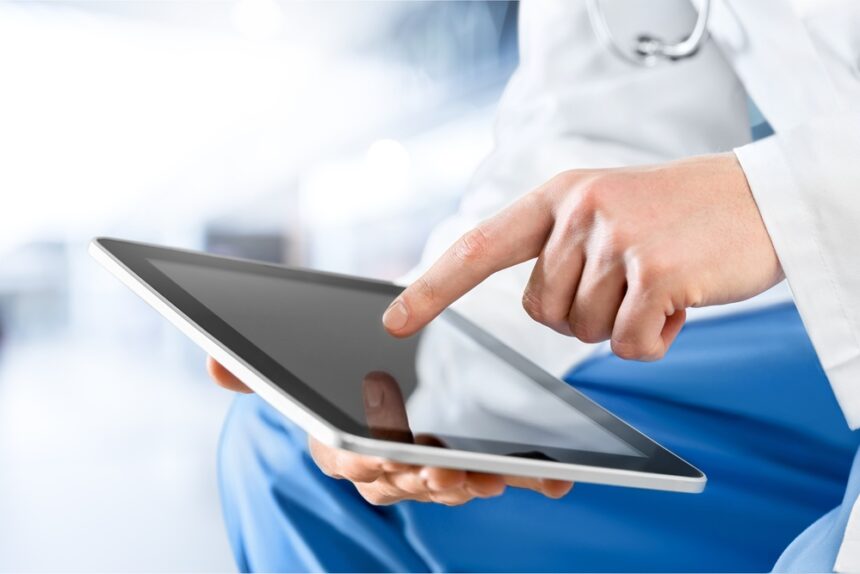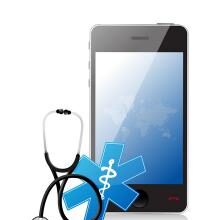Healthcare has always thrived on new technology, but it can still be challenging to see how something as trivial as a tablet can aid this field. iPads may possess simple functionality, which, nevertheless, becomes extremely useful when applied to healthcare. During the times of the coronavirus pandemic, iPads help make the shift to telemedicine faster and contribute in virtually all areas, from record-keeping to helping isolated patients connect with their loved ones.
What is So Special about the New iPad?
The 2020 iPad Pro is best known for its LiDAR scanner and an upgraded ARKit 3.5 (learn more here). The latter, in particular, makes the new iPad one of the best tablets for AR on the market. It brings users a realistic experience with incredible image quality, rapid world-building, and precise object positioning.
These AR apps allow the user to interact with multiple people within the environment, which makes an iPad a suitable tool for the next-generation video-conferencing. In healthcare, in particular, iPads can enhance telehealth by increasing the number of accessible professionals, helping patients connect to their families while isolated, and reduce health risks for hospital staff, visitors, and patients.
iPads Make Healthcare More Accessible
Many of those needing healthcare cannot access it due to language barriers or physical impairments. iPads can help reduce these obstacles. For instance, the Harris Health System in Texas has already implemented iPads to provide quick access to translators for patients who don’t speak English or can explain their condition better in another language.
iPads are also used to help bridge the communication gap between differently abled people and medical professionals. The tablets enable doctors to utilize video interpretation services in sign language as well as in spoken ones. This technology provides significantly increased efficiency and comfort in the treatment of people with hearing impairments, in particular.
Technology Enables Improved Record-Keeping
iPad Pro enables healthcare workers to move from room to room without the necessity to log out of the system or access a computer to enter or pull information. It’s significantly more efficient to have the ability to fetch each patient’s full profile without carrying a stack of papers with you. With the help of an iPad, doctors and nurses can focus on the patient and engage with them more fully now that all the necessary data is right at their fingertips at all times. The Apple Pencil and portable keyboards also simplify the process of making data entries and taking notes.
iPads Can Aid Health Workers During the COVID-19 Pandemic
iPads are particularly useful in 2020, with the coronavirus pandemic landing thousands in hospitals and cutting people’s ability to communicate with their loved ones face-to-face. Staff in many hospitals use donated iPads to help isolated patients connect with their families and friends. It helps alleviate the emotional burden of both patients and their loved ones who can’t visit them.
iPads also aid medical staff during end-of-life situations when relatives cannot be physically present in the room due to the virus. Several hospital networks housing COVID-19 patients have deployed systems that streamline the end-of-life care for such patients’ families. The revolutionary approach helps both the families and medical professionals.
For a patient’s loved ones, it is most frequently crucial to be present during the person’s final moments, to comfort them and give themselves the ability to process the individual’s passing in a healthy way.
Medical workers also benefit from the system, as they are often the only ones around the dying patient, and it is burdening to be singularly responsible for the patient’s emotional well-being during their final moments. In some cases, however, iPads enable doctors and nurses to be virtually present during end-of-life when patients don’t have anyone to contact.
The benefits of this virtual presence extend to providing essential medical care as well. iPads enable doctors who are in isolation but feel well to provide consultations without endangering their colleagues and patients. It partially resolves the problem of staffing caused by the pandemic since it increases the number of healthcare providers who can give their opinions on specific cases and even perform patient consultations. iPads also help reduce the risk of getting infected for elderly and immunocompromised doctors. Instead of sacrificing their health or halting their consultations, these professionals can now work and treat patients with incredible efficiency.
Wrapping Up
Unlikely as it sounds, iPads in 2020 are crucial tools to battle the current health emergency of COVID-19. They help introduce social distancing into the medical field, both among the professionals and patients’ visitors. iPads help people in isolation keep in touch with their families, and this technology also enables doctors who cannot be physically present at the hospital to make their contribution.
Overall, iPads revolutionize healthcare by breaking language barriers, improving the general accessibility of medical care, improving current data-keeping processes, and strengthening communication.









